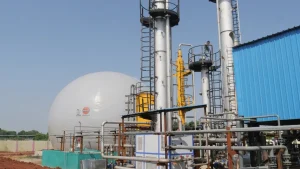New Delhi – Delhi Chief Minister Rekha Gupta has embarked on a significant environmental and spiritual journey, combining her commitment to green energy initiatives with religious devotion. During her two-day visit to Mathura district, the CM inaugurated a groundbreaking Bio CNG Plant and offered prayers for Delhi’s development at the revered Shri Banke Bihari Temple in Vrindavan.
Spiritual Beginning: Prayers at Shri Banke Bihari Temple

On Sunday morning, Chief Minister Rekha Gupta commenced her second day in Mathura district with a spiritual visit to the renowned Shri Banke Bihari Temple in Vrindavan. This temple visit followed her previous day’s inauguration of the innovative Bio CNG Plant, demonstrating her balanced approach to governance that combines environmental responsibility with cultural values.
During her temple visit, CM Gupta expressed her devotion and commitment to Delhi’s progress. “I had an opportunity to offer my prayers at Shri Banke Bihari Temple in Vrindavan today. I prayed for ‘Viksit Delhi’ along with ‘Viksit Bharat’. By God’s grace and blessing, we can do our maximum for Delhi’s development and serve the masses of Delhi with full dedication and commitment,” she stated after completing her prayers.
The Chief Minister’s temple visit was not merely ceremonial but reflected her deep-rooted belief in seeking divine blessings for the welfare of Delhi’s citizens. Her prayers encompassed both the development of Delhi and the broader vision of a developed India, showing her commitment to national progress alongside regional advancement.
Environmental Revolution: Bio CNG Plant Inauguration


The centerpiece of CM Gupta’s Mathura visit was the inauguration of a state-of-the-art Bio CNG Plant in Kamar village near Kosi Kalan on Saturday. This Bio CNG Plant represents a significant step forward in Delhi’s environmental initiatives, with a impressive capacity of 2.5 tonnes per day, demonstrating the government’s commitment to sustainable energy solutions.
Also Read: Maharashtra Cancels 3 Language Policy Resolution Amid Hindi Imposition Charges
The Bio CNG Plant inauguration was conducted in the presence of Uttar Pradesh cabinet minister and MLA from Chhata (Mathura), Laxmi Narain Chaudhary, highlighting the collaborative approach between Delhi and Uttar Pradesh governments in environmental matters. This Bio CNG Plant is expected to play a crucial role in waste management and green energy production.
During the Bio CNG Plant inauguration ceremony, CM Gupta emphasized the importance of such facilities in addressing multiple environmental challenges simultaneously. The Bio CNG Plant will not only produce clean energy but also help in effective waste management, particularly addressing the issue of cow dung disposal that has been affecting the Yamuna river.
Addressing Yamuna Pollution Through Bio CNG Plants


Chief Minister Gupta used the Bio CNG Plant inauguration as an opportunity to address the critical issue of Yamuna river pollution. She strongly criticized past governments for their failure to address pollution in the sacred river, emphasizing how the new Bio CNG Plant represents a solution-oriented approach to environmental challenges.
The CM stressed the importance of establishing cow dung gas plants like the newly inaugurated Bio CNG Plant to effectively curb waste and simultaneously produce green energy. This dual benefit approach makes the Bio CNG Plant an ideal solution for addressing both waste management and energy production challenges facing the region.
During her speech at the Bio CNG Plant inauguration, CM Gupta announced ambitious plans for expanding this green energy initiative. She revealed that two additional plants similar to this Bio CNG Plant would be commissioned by the end of this year, demonstrating the government’s commitment to scaling up sustainable energy solutions.
The strategic placement of these Bio CNG Plant facilities is specifically designed to prevent cow dung from entering the Yamuna river, addressing a major source of water pollution. This approach shows how the Bio CNG Plant initiative serves multiple environmental objectives simultaneously.
Expanding Green Energy Infrastructure
The Bio CNG Plant in Kamar village represents just the beginning of a larger environmental transformation initiative. CM Gupta’s announcement of two additional Bio CNG Plant facilities by year-end indicates a systematic approach to establishing a network of green energy production centers across the region.
Each Bio CNG Plant in this network will contribute to reducing organic waste while producing clean energy, creating a sustainable cycle that benefits both the environment and local communities. The Bio CNG Plant model demonstrates how traditional waste products can be transformed into valuable energy resources.
The scalability of the Bio CNG Plant concept makes it an attractive solution for rural areas where cow dung and organic waste are abundantly available. This Bio CNG Plant initiative could serve as a model for other states looking to implement similar environmental solutions.
Cultural and Religious Significance
Beyond the environmental initiatives, CM Gupta’s visit to Govardhan Girraj in Mathura on Saturday added a spiritual dimension to her trip. Accompanied by Meghshyam Singh, the local BJP MLA from Govardhan, she offered parikrama (circumambulation) of the sacred hillocks, demonstrating respect for local religious traditions.
“It gives immense peace to mind and soul when one offers prayers at Goverdhan,” CM Gupta remarked, highlighting how her spiritual practices complement her administrative responsibilities. This balance between environmental action, exemplified by the Bio Plant inauguration, and spiritual devotion reflects her holistic approach to leadership.
The presence of local political leaders during both the Bio Plant inauguration and religious visits underscores the collaborative nature of these initiatives, bringing together environmental, political, and spiritual elements for comprehensive regional development.
Future Implications and Environmental Impact
The Bio Plant inaugurated by CM Gupta represents more than just an energy facility; it symbolizes a shift toward sustainable development practices. This Bio Plant will serve as a demonstration project for similar initiatives across Delhi and neighboring regions.
The success of this CNG Plant could encourage private sector investment in similar green energy projects, creating a multiplier effect for environmental benefits. The Bio CNG Plant model shows how government initiative can catalyze broader environmental transformation.
With the planned expansion to include two more facilities by year-end, the CNG Plant network will significantly contribute to reducing pollution in the Yamuna while providing clean energy alternatives for local communities.
Closing Statements: A Model for Sustainable Governance
CM Rekha Gupta’s Mathura visit successfully combined environmental action with spiritual devotion, showcasing a comprehensive approach to governance. The Bio Plant inauguration demonstrates her commitment to practical solutions for environmental challenges while her temple visits reflect her connection to cultural values and community sentiments.

